Massive changes in Saudi Arabia, despite a weak housing market and struggling economy
Saudi Arabia’s housing market remains weak, amidst plunging oil prices coupled with the economic repercussions brought by the COVID-19 pandemic.
Saudi Arabia’s real estate index for the residential sector rose by 2.03% during the year to Q3 2020, following y-o-y rises of 1.84% in Q2 2020, 2.06% in Q1 2020, and 0.79% in Q4 2019, according to the Kingdom’s General Authority for Statistics (GAStat). However when adjusted for inflation, prices actually fell 3.51% y-o-y in Q3 2020.
Nationwide house prices have fallen by 18.2% from 2014 to 2019 (-20.4% inflation-adjusted), amidst weak economic growth and low oil prices.
Quarter-on-quarter, residential property prices fell by 0.51% in Q3 2020 (-6.09% inflation-adjusted).
By property type:
- Houses: prices declined by 1.26% during the year to Q3 2020 (-6.62% inflation-adjusted)
- Apartments: prices increased 1.45% y-o-y in Q3 2020 (-4.06% inflation-adjusted)
- Villas: prices increased by a meager 0.8% y-o-y in Q3 2020 (-4.68% inflation-adjusted)
- Residential buildings: prices fell by 0.87% (-6.25% inflation-adjusted) over the same period
- Residential lots: prices rose by 2.08% during the year to Q3 2020 but dropped 3.47% when adjusted for inflation
The real estate index indicator released by GAStat was launched in April 2017, based on the available registry data of real estate transactions from the Ministry of Justice.
Demand is falling sharply. In Safar, the second month of the Islamic calendar which runs from September 18, 2020 to October 16, 2020, the total value of real estate transactions in the Kingdom fell 36% y-o-y to SAR 9.7 billion (US$2.6 billion), following a 28% y-o-y fall in the first month, according to the country’s Justice Ministry.
Saudi Arabia’s economy is projected to contract by 5.4% this year, following expansions of 0.3% in 2019 and 2.4% in 2018 and a decline of 0.7% in 2017, according to the International Monetary Fund (IMF). It would be the Kingdom’s worst economic contraction since 1987.
Foreigners are allowed to own real estate, subject to approval of the licensing authority. However, foreign ownership is forbidden in Mecca and Medina, except through inheritance. Non-Saudi Muslims are can obtain leases of up to two years in these cities. Leases are renewable for the same period.
Foreign investors can also purchase private land for construction and investment, but also prior approval is required, and projects (buildings) must be valued more than SAR30 million (US$8 million), including land and construction costs.
Tax relief for homebuyers
In May 2020, the government tripled the value added tax (VAT) from 5% to 15% to shore up the country’s finances hit by the COVID-19 pandemic, as well as plunging oil prices. But in a bid to buoy demand for affordable homes, the housing minister agreed to absorb the tax hike for first-time homebuyers of properties worth SAR 850,000 (US$ 226,638) or less.
Then in October 2020, the government strengthened its efforts to boost the ailing housing market:
- All property deals will now be exempted from the 15% VAT, and instead subject to a new 5% tax on transactions.
- The threshold for the tax exemption for first time homebuyers was increased to SAR 1 million (US$266,620) from SAR 850,000 (US$ 226,638).
The move supports Crown Prince Mohammed bin Salman’s Vision 2030 of increasing homeownership to 70% by end-2030.
Sales are plunging again
Real estate sales volume rose slightly by 1.7% y-o-y to SAR 160.1 billion (US$42.7 billion) during the FY 2019-20, the first annual increase in six years following declines of 5% in 2018-19, 16% in 2017-18, 29% in 2016-17, 22% in 2015-16, and 16% in 2014-15.
However, demand plunged again this year due to the COVID-19 pandemic. In Safar (September 18, 2020 to October 16, 2020) the value of real estate transactions fell 36% y-o-y to SAR 9.7 billion (US$2.6 billion), following a 28% y-o-y fall in the first month, according to the country’s Justice Ministry.
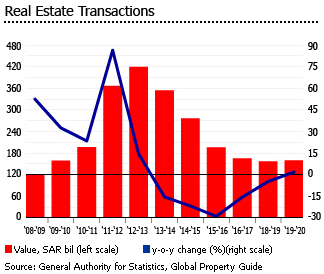
Local house price variations
Riyadh registered the biggest residential property price increase during the year to Q3 2020, at 10.18% (4.2% inflation-adjusted), in sharp contrast to the y-o-y fall of 6.47% seen in Q3 2019, according to GAStat.
Over the same period:
- In Jazan, residential property prices rose by 6.69% (0.89% inflation-adjusted), down from the prior year’s 12.62% growth
- In Al Baha, prices rose by 4.18% (-1.48% inflation-adjusted), after a slight y-o-y decline of 0.27% in Q3 2019
- In Hail, prices increased by a modest 3.87% (-1.77% inflation-adjusted), following a 4.11% increase in Q3 2019
- In Qassim, prices rose by 3.13% (-2.47% inflation-adjusted), after a 2.31% increase last year
- In Najran, prices increased by a meager 0.75% (-4.72% inflation-adjusted), following a y-o-y fall of 2.08% in Q3 2019
- In Madinah, prices increased slightly by 0.5% (-4.96% inflation-adjusted), after a y-o-y fall of 1.64% last year
- In Tabuk, prices rose by a miniscule 0.42% (-5.04% inflation-adjusted), following a slight y-o-y fall of 0.58% in Q3 2019
- In Asir, prices dropped 0.19% (-5.61% inflation-adjusted), following a y-o-y fall of 1.4% in Q3 2019
- In Makkah, prices fell by 1.43% (-6.78% inflation-adjusted), after a 3.42% y-o-y drop in the previous year
- In Al Jouf, prices fell by 2.23% (-7.54% inflation-adjusted), after a 2.49% y-o-y decline in the previous year
- In the Eastern Region, prices fell by 2.42% (-7.72% inflation-adjusted), following a y-o-y decline of 1.13% a year earlier
- In the Northern Borders, prices dropped 2.56% (-7.85% inflation-adjusted), in contrast to a y-o-y increase of 6.61% a year earlier
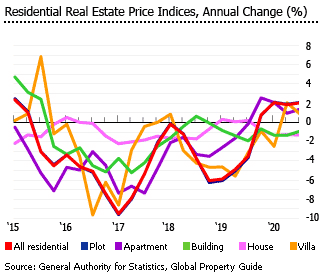
The Saudis have been encouraging residential investment
Mindful of the lessons of the 1970s to early 1980s, the Saudis have in recent years spent their petrodollars cautiously, reinvesting a large portion of the windfall into real estate and encouraging foreign investment.
After deep recession in the 1990s, a Foreign Investment Law was passed in April 2000 to encourage a service-oriented economy. Legally resident non-Saudis were allowed to own a private residence by a new Real Estate Law, except in Mecca and Medina, provided they obtained a license from the Ministry of Interior. They can also own real estate to conduct business and accommodate employees, again with Ministry of Interior permission. To prevent speculation, five years must elapse before property can be sold.
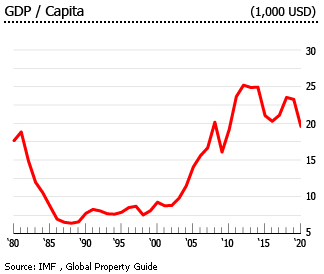
From 2002 to 2005, house prices rose by 13.7% annually while average land prices rose 16.5% per year, according to the National Commercial Bank Capital (NCBC). Residential property prices continued to rise from 2006 to 2013, albeit at a much slower pace.
The impact of the oil price decline
The recent fall in property prices has largely been caused by the dramatic decline in the price of oil in 2014. Ironically, it was the Saudis themselves who helped drive oil prices down, battling to keep their share of global oil markets.
One aim was to hurt Iran. Iran’s economy needs oil to trade around $135. Saudi Arabia’s own breakeven oil price at which the national budget is in balance is around $100 per barrel, according to Crude Oil Peak, an industry analysis site. However from 2015 to 2019, Brent spot price averaged just US$57.1 per barrel.
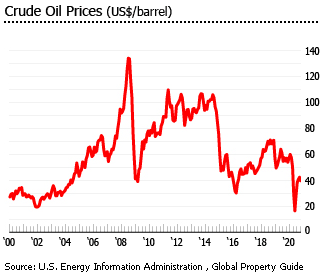
Despite this, Saudi Arabia has far larger cash reserves and is able to withstand a downturn in prices for much longer. Saudi Arabia is the world’s largest oil producer and exporter, and also has huge clout as leader of the Organization of the Petroleum Exporting Countries (OPEC). Petroleum accounts for more than 75% of government revenues and 90% of exports.
Saudi Arabia has compensated for its reduced oil revenues by running fiscal deficits. There was a deficit of 15.8% of GDP in 2015, 12.9% in 2016, 9.2% in 2017, 5.9% in 2018 and 4.5% in 2019. This was in sharp contrast with budget surpluses of about 13% of GDP from 2003 to 2013.
The deficit is projected to surge again to 12% this year.
The sharp increase in Saudi Arabia’s budget deficit in 2015 and after can be attributed to:
- The sharp decline of crude oil prices,
- Following King Salman’s recent accession to the throne in January 2015, he immediately spent a substantial amount of money on subsidies and public job bonuses, including extra months of additional salary to all government employees, in an effort to increase his popularity.
- Significant military expenditures on conflicts in Yemen and Syria, and support for Egypt.
From having the lowest share of public debt in the world at less than 2% of GDP in 2014, the kingdom’s public debt ballooned to around 22.8% of GDP in 2019, and is expected to rise to 34.4% of GDP this year.
The Saudi unemployment rate surged to an all-time high of 15.4% in Q2 2020, up from 11.8% in the previous quarter and 12.3% a year earlier, according to GAStat. The Kingdom’s inflation rate stood at 5.7% in September 2020, in sharp contrast to the previous year’s -0.7%.
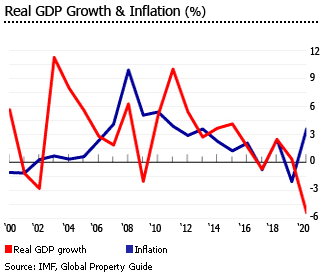
As of September 2020, crude oil traded at US$40.91 per barrel, sharply down from US$62.83 per barrel in the same month last year.
Expat workers are leaving the Kingdom
Some expatriate families have left the country due to the implementation of the expat dependent tax in July 2017. The tax started at SAR 100 (US$ 26.67) per month in 2017, and had to be paid by an expat worker for every dependent (including spouse, children, parents, etc.). The monthly fee increased to SAR 200 (US$ 53.33) in 2018, and to SAR 300 (US$ 80.00) in 2019. In 2020, the monthly fee increased again to SAR 400 (US$ 106.67).
And the Covid-19 pandemic has exacerbated the situation.
About 1.2 million expat workers are expected to leave the Kingdom this year, which is equivalent to about 9% of the total workforce, according to Jadwa Investment Company. In fact in the first half of 2020, up to 300,000 non-Saudi workers have already left the Kingdom, and during April 22 and June 3, at the height of the Covid-19 pandemic, over 178,000 applications from those wanting to return to their home countries were processed.
“By the end of 2020, we expect a total of around 1.2 million expat workers to leave the local labour market,” Jadwa predicted.
Before the pandemic, about 10 million expats lived in Saudi Arabia, out of a total population of 34.5 million.
“The population may fall by 4% in the Kingdom,” said Oxford Business Group Chief Economist Scott Livermore.
In an effort to improve labour market attractiveness, Saudi Arabia has recently eased foreign workers’ contractual restrictions, including the freedom to change jobs.
The reforms, which will take effect in March 2021, will give non-Saudi workers the right to change jobs by transferring their sponsorship from one employer to another, and permit them to leave and re-enter the Kingdom and secure final exit visas without the consent of their employer.
Yields are high, but rents continue to fall
In Riyadh, the average gross rental yield remains high at 10.5%, and around 7.52% in Jeddah, according to the STC Real Estate Index published by Stephane Tajick Consulting.
However, Saudi Arabia’s rental market has been trending down mainly due to the recent exodus of expat workers.
During the year to Q2 2020:
- In Riyadh, residential rental rates fell by 1% y-o-y in Q2 2020, according to JLL MENA.
- In Jeddah, residential rental rates dropped 5%
- In Makkah, residential rental rates fell sharply by 11%
“Looking ahead, residential rental rates in the Kingdom are expected to remain under pressure in the short-to-medium term, namely on the back of wider macroeconomic factors such as the growth in unemployment rates, and consequent contraction in household incomes,” said Dana Salbak of JLL MENA.
Housing supply continues to rise
Housing supply continues to rise in Riyadh and Jeddah, according to Jones Lang LaSalle (JLL).
In 2019:
- Riyadh’shousing supply was around 1.3 million units in 2019, up from 1.29 million units in 2018 and 1.26 million units at the end of 2017, according to JLL.
- Jeddah’s housing supply stood at 825,000 units last year, up from 817,000 units in 2018 and 813,000 units in 2017.
The capital city’s housing supply is expected to rise by around 15,000 units this year, with Jeddah’s increasing by around 8,000 units.
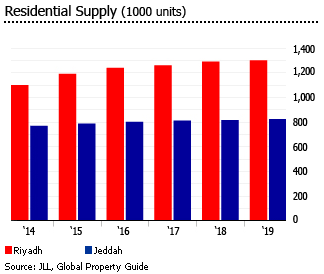
Despite this Saudi Arabia faces a housing shortage of around 1.5 million units, according to the Ministry of Housing. To tackle this Saudi Arabia’s cabinet approved a 2.5% tax on undeveloped and idle urban land plots or "white lands" four years ago, applicable to landowners of plots exceeding 5,000 square metres.
Boosting home ownership
The Kingdom’s population of 34.5 million is growing by more than 2% annually. It is dominated by young middle-class Saudis who are first time homebuyers, as 45% of the country’s population is below 20 years old. Expatriates represent almost a third of the total population, and they too need accommodation. Low and middle-income households make up about 80% of the unmet demand.
To boost affordable housing and the property market, mortgage financing is being made more accessible for Saudis:
- The Ministry of Housing’s “Sakani” program aims to deliver up to 300,000 housing and financing options in 2020. During the first installment in FY 2020, more than 32,285 families have benefitted from the program. The Sakani program helped over 157,000 families in 2018 and 300,041 families in 2019.
- In April 2018, down payment for the first housing was lowered from 10% to 5%, according to Real Estate Development Fund (REDF) General Supervisor Khalid bin Mohammed Al-Amoudi. The REDF also launched the “flexible installment” that allows adjustments to monthly installments in accordance to the beneficiary’s income.
- The Saudi Arabian Monetary Authority (SAMA), the country’s central bank, allowed banks to supply a higher share of funding for home purchases by increasing the banks’ maximum loan-to-value ratio for mortgages of first-time homebuyers from 85% to 90% in 2018.
- In January 2018, the REDF started offering subsidized mortgage financing to its existing recipients.
- The REDF approved a mortgage guarantee programme in October 2017, which makes it easier for a relative to be nominated as guarantor for mortgage loan financing.
- In October 2017, Saudi Arabia’s Public Investment Fund launched a mortgage refinancing company, called the Saudi Real Estate Refinance Company (SRC). The intention is that within 5 years it will refinance mortgages worth SAR 75 billion (US$ 20 billion). “The new company is designed to stimulate housing sector development in the kingdom by injecting liquidity in the real estate market,” said a statement.
- The SRC has launched an initiative in August 2018, allowing new and existing borrowers to apply for long-term mortgages at fixed rates. Aside from improving Saudi’s mortgage financing availability, this new initiative also provides protection from interest rate hikes.
These measures are part of Saudi Arabia’s National Transformation Program 2030, which aims to that 70% of households will be homeowners by 2030. In Q1 2020, homeownership already reached 62%, according to the country’s housing minister.
Small but rapidly expanding mortgage market
The Saudi Arabian Monetary Agency (SAMA), the kingdom’s central bank, decided to cut its repo rate by another 75 basis points to 1% in March 16, 2020, following a 50 basis point cut in March 3, in a bid to boost economic activity.
The reverse repo rate was also cut from 1.25% to 0.5%.
This has helped the mortgage market to maintain its robust growth despite the pandemic. In Q3 2020, new residential mortgage loans reached 208,505 contracts, up by 90% from a year earlier, according to SAMA. Likewise, the value of new residential mortgage loans also surged 84% y-o-y to more than SAR 96.7 billion (US$25.8 billion) in Q3 2020.
About 96% of mortgage contracts in September 2020 were government-subsidized loans.
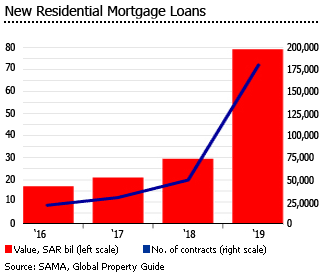
Residential villas accounted for the biggest share of funding of about 80%, followed by apartments (15%) and residential lots (5%).
Last year, the number and value of new residential mortgage loans in the Kingdom increased by 3.5 times and 2.7 times, respectively.
The central bank expects outstanding mortgages to reach SAR 500 billion (US$133. 3 billion) by end of this year. The mortgage market is currently about 15% of GDP.
The Real Estate Development Fund (REDF), a state-funded entity, currently dominates the home financing market.
Major real estate developments
The Kingdom is preparing new real estate projects that will be built through public-private-partnerships as part of its Vision 2030. These projects include mega developments: NEOM, the Red Sea Project, Qiddiya, and Amaala.
The urban project NEOM is a 26,500 sq. km. planned mega-city and business zone worth US$ 500 billion, which will be located on the Red Sea near Saudi Arabia’s northeast border with Jordan and Egypt. This was unveiled by Saudi Crown Prince Mohammed bin Salman bin Abdulaziz in October 2017 during a Public Investment Fund (PIF) conference. The construction of NEOM Bay, the first urban area within the development, began in the first quarter of 2019 and is expected to be completed in 2020. The whole project is expected to be fully completed in 2025.
Another ambitious project, the Red Sea project, had its masterplan approved in January 2019. This development by The Red Sea Development Company (TRSDC) is a 34,000 sq. km. tourism centre located between the cities of Umluj and Al-Wajh, which includes around 10,000 hotel rooms. The completion of the project’s Phase 1 is due in 2022, consisting of 14 luxury and hyper-luxury hotels with a total of 3,000 hotel rooms, and facilities such as an airport, yacht berths, and recreational facilities.
Qiddiya Entertainment City is a 334 sq. km. entertainment development located 40 km from Riyadh city centre that will feature a Six-Flags-branded theme park, along with other leisure facilities and hotels. The project’s construction commenced last year.
The Kingdom is also setting a wellness tourism destination called Amaala. This 3,800 sq. km. development will be built at the Kingdom’s northwestern coast and will consist of about 2,500 luxury hotel rooms, 200 retail establishments, 700 villas, a dedicated airport, marinas, and art galleries. The project’s Phase 1 is expected to open by end-2020, and is set to be fully completed in 2028.
Other ongoing residential construction projects in the Kingdom include: Thakher City Residential Towers (2,750 apartments); Jeddah Gate (4,000 apartments); Rafal Sky Gardens (286 apartments; ETLAL Residence (182 apartments); Jabal Omar Development (509 apartments); Jeddah Tower (500 apartments); and Saudi Aramco – Fadhili Residential Compound – Housing Package (2,000 villas).
Saudi Arabia also has other construction projects planned, aiming to improve infrastructures, diversify its economy, and raise the citizens’ living standards. The Kingdom’s other top construction projects, among many others, include:
- The Riyadh Metro
- Riyadh Rapid Bus Transit System
- Jeddah Tower
- The third expansion of Makkah Grand Mosque
- Expansion of the King Fahad Medical City
- King Abdullah Bin Abdulaziz Medical Complexes
- Sakani Homes
- King Salman Energy Park (Spark)
Crown Prince Mohammed bin Salman is Saudi’s de facto ruler
In June 2017, Mohammed bin Salman was appointed as Crown Prince, after the king deposed Muhammad bin Nayef and relieved him of all his positions. The kingdom started a massive corruption crackdown, which led to the arrests of at least 11 princes, four ministers, several ex-ministers and businessmen. Among the arrested were billionaire Prince Al-Waleed Bin Talal bin Abdulaziz Al Saud.
However the anti-corruption campaign caused local political unrest, and was seen as consolidating the crown prince’s power.
In addition, the crown prince’s aggressive stance in foreign policy threatens the region’s stability. Crown Prince Mohammed is said to be behind the economic boycott of Qatar since June 2017. The crown prince has also been in a word war with Iran after he called Iran’s Supreme Leader "the new Hitler of the Middle East", in an interview with the New York Times. He was also condemned for pursuing a war in neighboring Yemen, which has resulted to a humanitarian catastrophe.
Saudi Arabia also faced a political crisis due to the disappearance and killing of the journalist Jamal Khashoggi, last seen at the Saudi Consulate in Istanbul on October 2, 2018. The news of Khashoggi’s murder initially deterred potential investors in doing business in the kingdom. One of the first executives to negatively reacted to the news was British billionaire Richard Branson, who suspended his advisory role for the two Vision 2030 projects in the Red Sea that he’s involved with. Branson also suspended talks with the Saudi government regarding a US$ 1 billion investment in Virgin’s space companies.
In October 2020, Hatice Cengiz, the fiancée of slain Khashoggi formally filed a lawsuit accusing Saudi crown price and more than two dozen other Saudis of murder and dismemberment.
While Crown Prince Mohammed had earlier denied any involvement, the brutal murder of Khashoggi had already badly damaged his international reputation.
SOURCES:
- Real Estate Price Index Third Quarter, 2020 (General Authority for Statistics): https://www.stats.gov.sa/en/6652
- Saudi Arabia´s annual real estate deals hit SAR 160.1 bln, first rise in 6 years (Argaam): https://www.argaam.com/en/article/articledetail/id/1405045
- Saudi Arabia´s real estate deals fall 36% to SAR 9.7 bln last month (Argaam): https://www.argaam.com/en/article/articledetail/id/1420423#:~:text=The%20value%20of%20Saudi%20Arabia´s,on%2Dmonth%20(MoM).
- Consumer Price Index (General Authority for Statistics): https://www.stats.gov.sa/en/394
- GaStat launches real estate index indicator (General Authority for Statistics): https://www.stats.gov.sa/en/news/178#:~:text=On%20Monday%2027th%20of%20Rajab,are%20about%20real%20estate%20transactions%20.
- The KSA Real Estate Market Q2 2020 (JLL): https://www.jll-mena.com/content/dam/jll-com/documents/pdf/research/jll-mena-the-ksa-real-estate-market-q2-2020.pdf
- The KSA Real Estate Market A Year in Review 2019 (JLL): https://www.jll-mena.com/content/dam/jll-com/documents/pdf/research/jll-2019-year-in-review-report-for-ksa.pdf
- Saudi Arabia’s property market resilient, outlook positive despite coronavirus: JLL (Al Arabiya): https://english.alarabiya.net/en/business/economy/2020/10/20/Saudi-Arabia-s-property-market-resilient-outlook-positive-despite-coronavirus-JLL
- JLL: VAT exemption to create momentum for KSA residential mortgage (arabianindustry.com): https://www.arabianindustry.com/construction/news/2020/oct/24/jll-vat-exemption-to-create-momentum-for-ksa-residential-mortgage-6449092/
- Saudi Arabia scraps VAT for property deals (Gulf Business): https://gulfbusiness.com/saudi-arabia-scraps-vat-for-property-deals/
- Saudi Tax Relief Unleashed for Home Buyers to Keep Boom Rolling (Bloomberg): https://www.bloomberg.com/news/articles/2020-10-04/saudi-tax-relief-unleashed-for-home-buyers-to-keep-boom-rolling
- World Economic Outlook Database, October 2020 (International Monetary Fund): https://www.imf.org/en/Publications/WEO/weo-database/2020/October/select-subjects?c=456,
- Saudi Budget and Forecast 2021 indications mentioned by the Finance (Riyadh Xpress): https://xpressriyadh.com/saudi-budget-and-forecast-2021-indications-mentioned-by-the-finance/
- The STC 2018 Real Estate Index (STC): https://globalresidenceindex.com/hnwi-index/real-estate-index/
- Expats must pay dependents’ fees before Iqama renewal or re-entry visa: Passports Department (Arab News): https://www.arabnews.com/node/1123101/saudi-arabia
- More than a million foreign workers expected to leave Saudi Arabia in 2020 (Middle East Eye): https://www.middleeasteye.net/news/one-million-foreign-workers-expected-leave-saudi-arabia-end-2020-report
- Saudi Arabia to remove key restrictions on foreign workers (Al Jazeera): https://www.aljazeera.com/economy/2020/11/4/saudi-arabia-plans-to-remove-key-restrictions-on-foreign-workers
- Saudi unemployment increases to 15.4% in Q2/2020 (General Authority for Statistics): https://www.stats.gov.sa/sites/default/files/LM_2Q2020%20%28Press%20release_EN%20%29.pdf
- Saudi Ministry´s ´Sakani´ programme benefits 32,285 families in January (Construction Week): https://www.constructionweekonline.com/business/262870-saudi-ministrys-sakani-programme-benefits-32285-families-in-january#:~:text=The%20´Sakani´%20programme%20aims%20to,%2C%20and%20self%2Dconstructed%20units.
- "SAMA": Mortgages loans reached 208,505 Contracts until Q3 of 2020 (Saudi Press Agency): https://www.spa.gov.sa/viewfullstory.php?lang=en&newsid=2149798